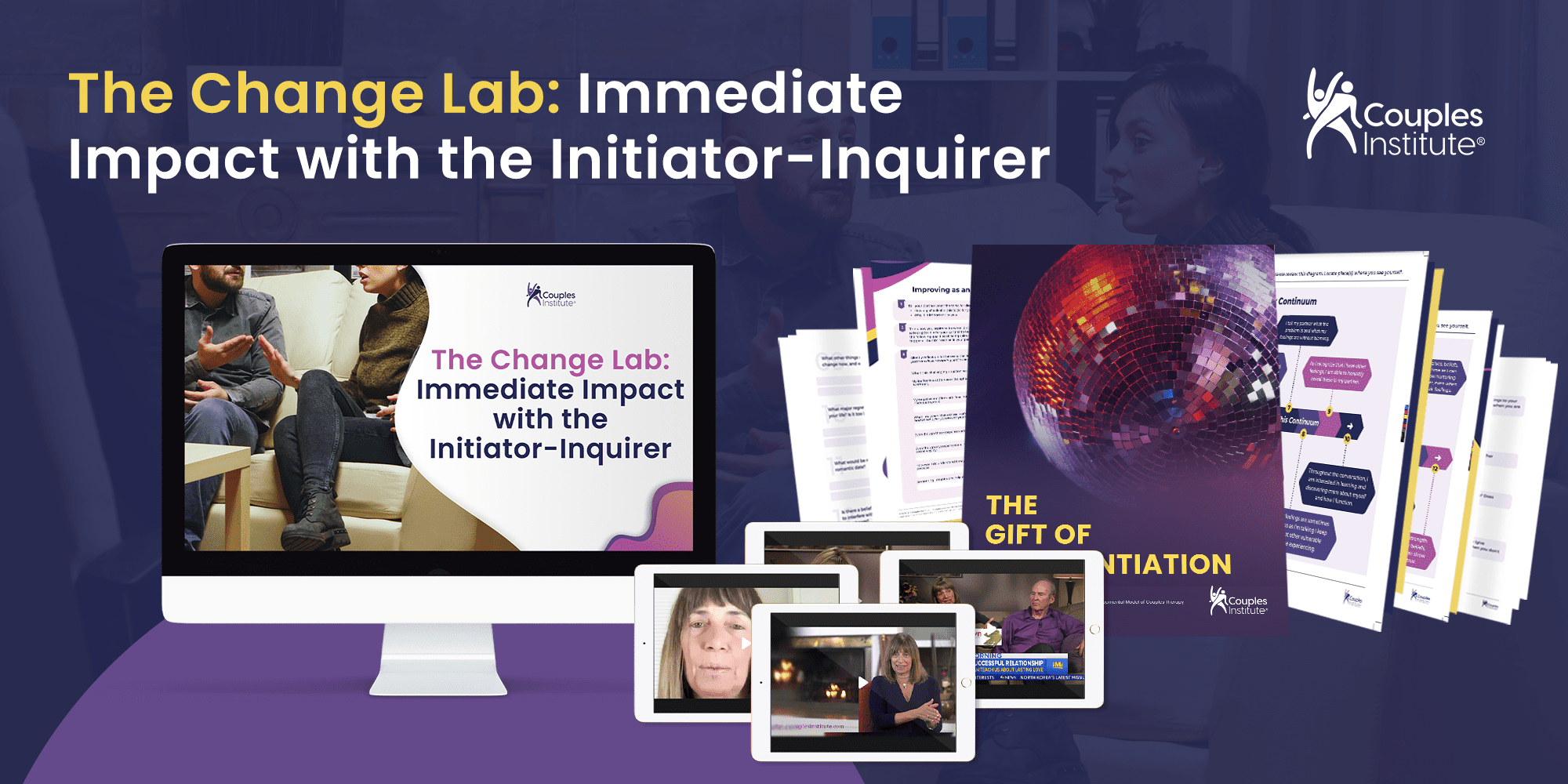Become a Highly Confident Therapist, Even with Conflict Avoidant or Hostile Couples,
in Record Time!





Growing up, most of us didn’t learn how to collaborate with an equal. We were in situations with parents, teachers, coaches – all hierarchical relationships. We learned to fall in line and quiet the parts of ourselves that created conflict, or we learned that yelling and being combative were the ways to be heard.
Couples take these patterns into their relationships and then feel incredibly uncomfortable when their partner wants something different than they do. They dance around issues, fighting or ignoring them until the tension is so unbearable they come to you and expect you to wave a magic wand and fix it.
In our decades of observing, experimenting, practicing, and refining, we discovered a counterintuitive way to structure sessions that prevented many pitfalls where even the best therapists were getting stuck.
Ellyn’s Shocking Realization About Couples Therapy

After helping couples “problem solve,” Ellyn realized that even if you ”fix the problem” you’re still not solving it!
What matters more than anything is how couples talk about the problem. How they deal with it together, how they listen to one another, and how they reveal themselves. THAT is what matters the most. It’s what will make or break most relationships.
Once Ellyn shifted her work to helping couples develop internal emotional muscle, everything changed.
Take Problem Solving Off the Table
Surprisingly, when Ellyn started saying to couples, “we’re going to take solving problems off the table,” they felt relieved.
So if we’re not solving their problems, what are we doing?
We are building emotional capacity that supports them functioning as a team.
You might say to a couple, “You’ve had no practice being a team – until today. I’m going to get you thinking differently about how to talk about issues. You’ll learn to accept conflicting parts of yourself and your partner. You’ll learn how to sit in the tension while you discuss charged topics without rushing to premature decisions. You’ll develop the skills to collaborate. You’ll learn to talk more deeply and have more productive conversations. And ultimately, you’ll learn more about yourself and your partner. Are you on board?”
The bonus of this approach – problem solving often naturally happens after both partners feel understood and can discuss options. Working from this framework, called the Initiator-Inquirer, means clients feel like they’re getting the change they came for.

- Barbi Pecenco, LMFT, Newport Beach, CA
- Marian Meade, RN Psychotherapist, Canada


- Fiona Daly, Psychotherapist, Wicklow, Ireland
Why The “No Change” Discussion Actually Leads to the Most Change
If you’ve found yourself on the Not-So-Merry-Go-Round of slipping away from the core issues, getting dominated by clients, unsuccessfully imploring clients to come forward, your best bet is to go waaaaay back.
Think kindergarten.
The Initiator-Inquirer process shows you how to remind clients of one very crucial skill they learned in kindergarten: taking turns.
It may sound simple, but it’s profound. When clients really learn how to take turns listening (inquiring) and talking (initiating), it helps them understand one another.
Equally important – it helps you understand exactly where they’re stuck and how to better help them.

If you take “negotiation” off the table and focus on helping clients understand one another, their ability to solve problems skyrockets – with or without you. And don’t we all want clients practicing their new skills outside of sessions?
That’s what’s so powerful and profound about this process. It helps any couple, no matter their presenting problem, eventually learn to resolve their own issues without drama, fighting, or withholding. It also supports both partners working at the same time, you’re no longer in the middle, and time is used much more effectively.
Sounds like a bold promise, but I’ve seen it happen again and again, as have thousands of therapists I’ve trained around the world.


– A client reflecting

Get The Change Lab $247 Discount
(50% OFF)
Using The I-I with Conflict Avoidant Couples
Conflict avoidant couples have a long history of avoiding truth telling and truth listening. No one ever taught them that conflict is normal and human – and could propel them forward.
When you use the I-I to encourage a client to bring something up, you’re stopping their passivity and inspiring both partners to be engaged. This process doesn’t let one partner tune out and ignore the other. It puts healthy pressure on the couple to show up – and that risk taking has the capacity to raise the bar to where growth happens in a conflict avoidant system.
Using The I-I with
Hostile Couples
If you have highly reactive couples, your best shot at being successful out of the gate is to spend a dedicated session setting them up for this process. While it might feel too boring or too structured, one session is a small price to pay for many future sessions of connection, growth, and success.
These are the couples who need the most structure. A great feature of this process is that it gives you more permission to interject, butt in, and change direction quickly.
And once they start to internalize the skills, your sessions go much better and the couple feels like your sessions are deeply meaningful.
I want to help YOU become a highly skilled couples therapist… so you can confidently lead your sessions, get out of the middle, get traction with your toughest clients... and enjoy the work you do for clients who truly appreciate your skills.
Even though my Developmental Model of Couples Therapy program is now closed to new members, I still wanted to give a tool you can use immediately.
My desire to help therapists has never gone away. In fact, it has only gotten stronger in the face of the changes to our profession.
While CE courses and educational institutes are shouting from the rooftops that excellence can be developed in short bursts…
and new online mental health organizations are promising successful couples therapy in 45 minutes…
You probably know in your heart that couples’ issues are far more complex than that and your 45 minutes would be better spent on lunch or a walk!
But I also know you lead a busy life.
That’s why I took the absolute best of 20+ hours of Initiator-Inquirer training and condensed it into a targeted collection of videos and role plays.
HERE’S WHAT’S INCLUDED…
- A treasure trove of training video pared down to 2 hours
- 4+ hours of effective demonstrations with commentary
- 10 of our most popular handouts including: Structuring Effective Initiation, The Initiator & Inquirer Continuums, Common Misconceptions During the I-I, Questions for a Difficult Conversation, and more! Historically, the only way to get these handouts is to be part of my $1,997 couples therapy membership. But today, you’ll get all 10 handouts when you enroll in The Change Lab.
YOU’LL ALSO LEARN TO…
- Teach clients to delay gratification so they’re not demanding you attend to each of their needs every session
- Increase their ability to manage reactivity and and tolerate anxiety (this is the magic wand I teach every therapist to wave over their clients)
- See very clearly where each partner is breaking down and give them the necessary skills to move forward while you get out of the middle
- Work with both people at the same time so no one complains about being left out or accuses you of taking sides
- Talk about issues in a way that helps each person know and own their part
- Strengthen clients’ ability to have productive conversations without you
- Get permission to intervene in a way that clients don’t feel controlled or shut down
- Dominique Smajstr, Psychotherapist & Couples Therapist, NSW, Australia

Enter The Change Lab Now!
(50% OFF)
IN ADDITION TO THE ABOVE, I ALSO SHARE…
- The “6 Word Remote Control” to rewind and recover any time this process goes off the rails
- Tips to coach someone who has trouble staying in the inquirer role
- How couples can discuss charged topics without rushing to premature decisions (when this happens, usually they’re not happy about the decision anyway)
- How people can accept conflicting parts of themselves and their partner
- Ways to develop the skills couples need for collaboration
- A framework for couples to communicate
- How clients can use this process to be more of who they want to be
Look Over My Shoulder During an I-I
This process works with money issues, affairs, parenting issues, explosive fighting couples, extreme passivity, and even clients with narcissistic tendencies.
That’s why I’ve included several roleplays that show you exactly how this process unfolds with some of the toughest kinds of problems.
Learn all about the Initiator-Inquirer, including…
- Exactly how to describe the process to your couples, including a step by step description of each role
- What you can be doing and what to listen for during the process
- What challenges to notice
- Why it’s still successful if either partner breaks down, and how that can still create meaningful progress
- 3 options of what to say and do when someone is struggling in their role
- What to think about or point out afterwards
- How to steer the questions back to ones that really matter
- A demonstration of a safe and comfortable way to give clients a taste of the process
HERE’S EVERYTHING YOU GET IN THE CHANGE LAB…
Module 1: Overview of the Initiator-Inquirer Process
- 4 principles of a formal setup of an I-I
- Tips on effective initiation
- Tips for effective inquiring
- 8 key things the Initiator-Inquirer accomplishes
- Addressing frequent questions about empathy, soothing moments, knowing when a couple is ready, who the I-I is appropriate for, and who to avoid using the I-I with
- Presentation Slides
Module 2: Structuring Effective Initiation and Inquiring
- 9 common challenges in using the I-I so you can anticipate what you’ll hear from a client and not be caught off guard
- What to do when an I-I is “unsuccessful” – there are surprisingly rich possibilities that lay in these moments to make it a success
- Common breakdowns in the Initiator and Inquirer role – knowing these helps you be prepared for pushback from your clients
- The capacities that are developed and strengthened by each role
- The Gift of Differentiation, a handout we use with all clients
- Initiator-Inquirer Demonstration
- Initiator-Inquirer Exercise
- Common Misconceptions During the I-I Exercise
- Presentation Slides
Module 3: How to Introduce and Set Up the Initiator-Inquirer
- Positioning the I-I as a way to help clients build emotional muscle (self and other-differentiation) so they can collaborate effectively and get through tough stuff together
- How the structure of the I-I paves the way for deeper work (and how this supports you even if you like to work from intuition)
- A demonstration of an I-I with a husband who had an emotional affair with a coworker
- Initiator Continuum - enables clients to identify where they are and where they want to be
- Inquirer Continuum
- Initiator inquirer role descriptions
- All-Purpose Questions for a Listening Partner to Ask during a Difficult Discussion
- Improving as an Effective Initiator
Module 4: Initiator Inquirer Role Play
- Video demonstration of an I-I with a real couple
- A demonstration of an I-I with a husband who had an emotional affair with a coworker
- How to use normal anxiety to inform your next steps
- Signs of messy initiation and how to help clients stay in a self-revealing role
- Demonstrations of using the handouts
- Assisting clients in each role and deciding who to focus on
Enter The Change Lab Now!
(50% OFF)
How Does The Change Lab Work?
The entire Initiator-Inquirer process is laid out in a comfortable course you can watch immediately.
You can view the videos and download the handouts to get started right away.
There’s no homework, no waiting for lessons to be released. Just instant access to everything you need to know about the Initiator Inquirer.
By the end, you’ll be able to help clients learn more about one another, find soothing moments of empathy, and create communication breakthroughs that help clients understand one another.

- Marisa Koten, Ph.D., NY
- Kate Creedy, Family & Systemic Psychotherapist, UK

What’s The Investment?
The Change Lab is a STEAL of a deal.
And if you were to buy each of these materials individually, (which you can’t) it would cost $699.
And if you were to join my Developmental Model program where all this material (and more!) lives, it would cost $1,997.
If you were to hire me for a consultation… well, I don’t consult anymore to almost anyone.
But… I realized not everyone could afford that, especially these days.
I wanted to make this super affordable, so any therapist who wanted to learn this proven intervention could get access to it at a reasonable price.
So…
I’m not going to charge $1,997.
And my team told me the material is so effective and comprehensive we should sell it for at least $795.
Think about it this way…
How many clients would you need for this to pay for itself?
Probably not many.
I bet if you made progress with your next couple, they’d be convinced that therapy with you is worth the investment and they’d stick around. They might even refer their friends to you.
Frequently Asked Questions
Enter The Change Lab Now!
(50% OFF)
Featured In:


 We respect your privacy,
We respect your privacy,